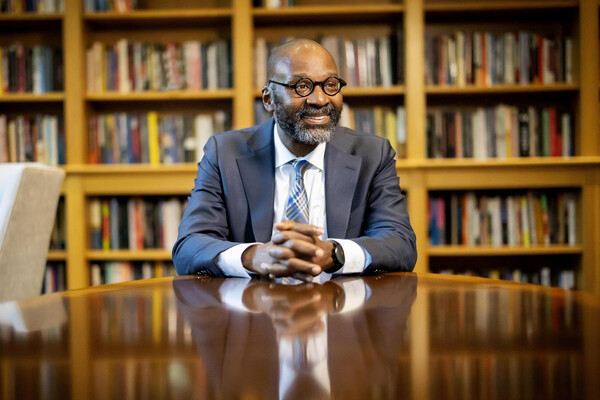
Griffin Pitt, right, works with two other student researchers to test the conductivity, total dissolved solids, salinity, and temperature of water below a sand dam in Kenya.
(Image: Courtesy of Griffin Pitt)
PHILADELPHIA – A ceremony today will cement the partnership between the KIPP Foundation and the University of Pennsylvania to increase college-completion rates for underserved KIPP students nationwide. To support this partnership effort, Martha and Bruce Karsh have contributed resources to help KIPP alumni as they make their way toward Penn degrees.
The ceremony will be held from 3:15 to 4:15 p.m. on the ground floor of the McNeil Center for Early American Studies, 3355 Woodland Walk, on the Penn campus.
Speaking at the event will be Amy Gutmann, president of Penn; Mike Feinberg, KIPP co-founder and superintendent; Eric J. Furda, Penn’s dean of admissions; and Martha Karsh, a member of KIPP’s national board. The Karshes are former Penn parents.
Their gift provides Penn with new resources to actively recruit KIPP students, underwrite their financial aid and offer them targeted support once they get to campus. Beginning in the 2013-14 academic year, Penn projects annually enrolling 12-15 KIPP students who meet admissions requirements. This community of KIPP students will support each other on their journey through college. Penn's no-loan financial-aid policy for all eligible undergraduates enables the University to enroll the most talented students, regardless of socioeconomic status.
Penn’s partnership with KIPP, the Knowledge Is Power Program, is part of the University’s long-standing commitment to diversity and excellence.
Penn seeks to build a student body of highly talented individuals and believes that having a diverse student body enriches the educational experience of every student and broadens the leadership pipeline of graduates. This partnership is one way in which the University aims to engage outstanding yet underserved students with high potential who might not otherwise have the opportunity to go to Penn.
"Making a Penn education available to talented, hard-working students from every walk of life is the cornerstone of our efforts to increase educational access," Gutmann said. "A partnership between Penn and KIPP is a natural fit, and we could not be more supportive of KIPP's mission to prepare and help enable students in underserved communities to reach their highest potential."
Partnering with KIPP, Furda said, will help the University “learn about what it takes to help support students who have the talent and motivation but are coming from backgrounds that are perhaps disadvantaged in certain ways. We welcome these bright, goal-oriented students to Penn.”
KIPP’s connection to the University of Pennsylvania is especially resonant, as KIPP co-founder Mike Feinberg is an alumnus of the Class of 1991. Feinberg founded KIPP with Dave Levin in Houston in 1994; since then, KIPP has grown into a national network of 125 college-preparatory public charter schools serving 39,000 students in 20 states and the District of Columbia. More than 85 percent of KIPP’s students are from low-income families, and more than 95 percent are students of color. According to a 2010 study by Mathematica Policy Research, KIPP middle schools are achieving academic gains in math and reading that are statistically significant and substantial.
“I could not be more grateful that the Karshes have stepped up to invest in the futures of our KIPPsters,” Feinberg said. “Their incredibly generous gift will open doors of opportunity for countless KIPP alumni to pursue their dreams.”
According to U.S. Census data, 31 percent of all Americans aged 25-29 have earned a college degree. For students in the bottom economic quartile, only 11 percent complete college by their mid-20s. By contrast, 36 percent of KIPP students have completed a four-year college after finishing eighth grade at a KIPP middle school 10 or more years ago, more than the average for all students across all income levels and three times the rate for students from low-income families. Through initiatives across the KIPP network, including college partnerships with institutions like Penn, KIPP aims to reach a 75 percent college completion rate for its students, roughly the same rate at which the nation’s highest-income students are graduating from college.
Philadelphia is home to four KIPP charter schools. Founded by Teach For America alumnus Marc Mannella, KIPP Philadelphia Schools currently enrolls 1,250 students in Philadelphia and plans to grow to 10 schools serving 4,400 students by 2019. A handful of Penn students have participated in the work-study program at KIPP Philadelphia Schools in past years, and this partnership aims to increase the number of Penn work-study students at KIPP in the future.
“We are excited about this groundbreaking partnership with Penn, a university that is so committed to diversity,” Mannella said. “We also look forward to bringing more Penn students to work with KIPP Philadelphia Schools. They are role models for our students, contributing to our mission of seeing KIPPsters to and through college.”
About KIPP
KIPP – the Knowledge Is Power Program – is a national network of open-enrollment, college-preparatory public charter schools with a track record of preparing students in underserved communities for success in college and in life. KIPP was founded in Houston in 1994 and has grown to 125 schools serving more than 39,000 students in 20 states and Washington, D.C. More than 95 percent of students enrolled in KIPP schools are African-American or Hispanic/Latino, and more than 85 percent qualify for the federal free and reduced-price meals program. To date, more than 85 percent of students who have graduated from KIPP middle schools have matriculated to college.

Griffin Pitt, right, works with two other student researchers to test the conductivity, total dissolved solids, salinity, and temperature of water below a sand dam in Kenya.
(Image: Courtesy of Griffin Pitt)

Image: Andriy Onufriyenko via Getty Images

nocred

Provost John L. Jackson Jr.
nocred